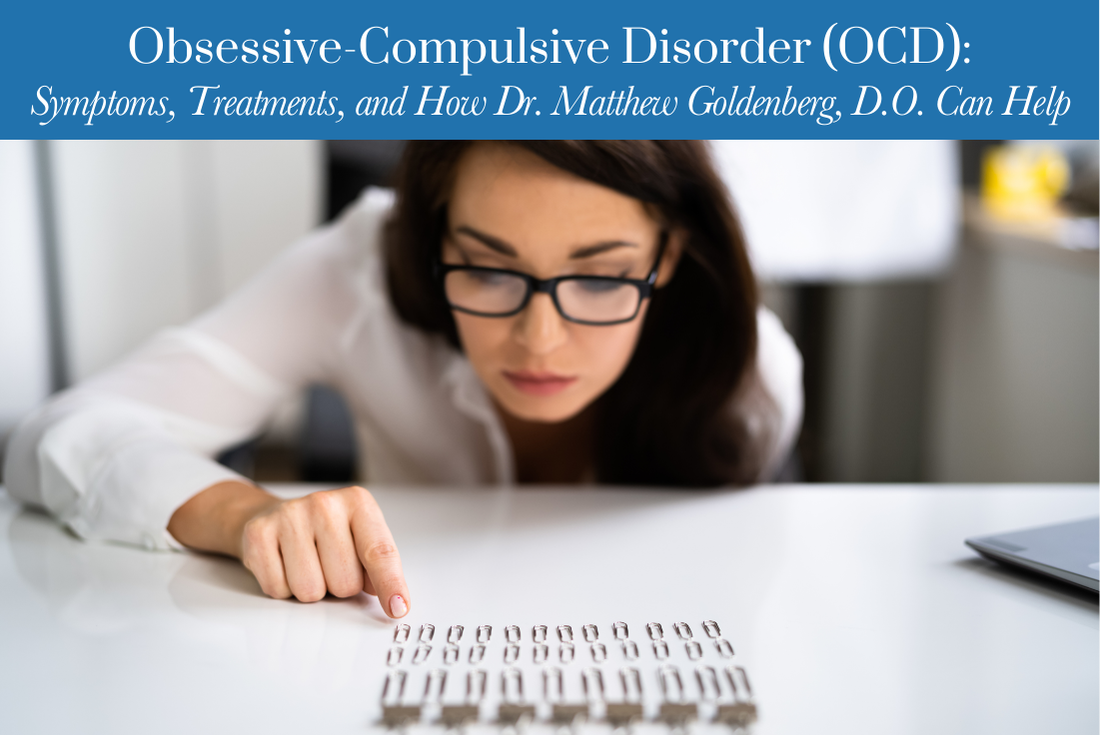
Dr. Matthew Goldenberg, D.O., specializes in the diagnosis and treatment of OCD, providing compassionate and evidence-based care to patients from his office in Santa Monica, CA, and by secure telehealth to those in the states of California, Hawaii and Alaska.
What is Obsessive-Compulsive Disorder (OCD)?
OCD is a chronic mental health condition in which individuals experience unwanted thoughts (obsessions) that can lead to compulsive behaviors. These behaviors are often performed to reduce anxiety caused by the obsessions, but they only provide temporary relief. The cycle of obsessions and compulsions can become overwhelming and interfere with daily functioning, work, and relationships.
Common Symptoms of OCD
OCD symptoms typically fall into two categories (you can experience one or the other, or both):
1. Obsessions (Intrusive Thoughts)
- Fear of contamination (e.g., excessive worry about germs or cleanliness)
- Unwanted aggressive or taboo thoughts (e.g., about harming oneself or others)
- Fear of making mistakes or forgetting something important
- A need for symmetry, order, or exactness
- Unwanted doubts or fears related to personal safety
2. Compulsions (Repetitive Behaviors)
- Excessive hand washing or cleaning
- Checking behaviors (e.g., repeatedly ensuring doors are locked, stove is off, the garage is closed etc.)
- Counting, tapping, or repeating words silently
- Arranging objects in a precise manner
- Seeking reassurance from others
Many individuals with OCD recognize that their thoughts and behaviors are irrational, and out of proportion to what other people experience, yet they feel powerless to stop them. The distress caused by OCD can be debilitating, leading to social isolation, anxiety, and depression.
What Causes OCD?
The exact cause of OCD is unknown, but research suggests a combination of genetic, neurological, environmental, and psychological factors play a role. Some potential contributing factors include:
- Genetics: A family history of OCD increases the likelihood of developing the condition.
- Brain Structure and Functioning: Studies suggest that people with OCD may have differences in brain activity and neurotransmitter function, particularly with serotonin.
- Life Experiences: Traumatic events, high stress, or childhood abuse may trigger or worsen OCD symptoms.
- Infections: Some studies suggest that streptococcal infections (PANDAS) in childhood may be linked to the onset of OCD.
How is OCD Diagnosed?
OCD is diagnosed based on symptoms, their severity, and how they impact a person’s life. A mental health professional like Dr. Matthew Goldenberg, D.O. will perform a comprehensive evaluation that includes:
- A clinical interview
- A discussion of symptom patterns and frequency
- An assessment of the impact on daily life
- Rule out of other mental health conditions, such as anxiety disorders or depression
- Discussing past treatment attempts
- Ruling out drugs or alcohol’s contributions to symptoms or attempts to self-medicate.
Effective Treatment Options for OCD
Treatment for OCD focuses on managing symptoms through therapy, medication, and/or lifestyle changes.
1. Cognitive-Behavioral Therapy (CBT)
CBT is the most effective treatment for OCD, specifically a technique called Exposure and Response Prevention (ERP). ERP helps patients gradually face their fears (exposures) while learning to resist compulsive behaviors (response prevention). Over time, this helps reduce anxiety and obsessive thinking.
2. Medication
Selective serotonin reuptake inhibitors (SSRIs) are commonly prescribed to help regulate brain chemistry and reduce OCD symptoms. Medications such as fluoxetine (Prozac), fluvoxamine (Luvox), and sertraline (Zoloft) have been shown to be effective.
3. Alternative and Complementary Treatments
For some patients, additional approaches may provide relief, including:
- Mindfulness and meditation to reduce anxiety
- Diet and exercise to support mental health
- Support groups to connect with others facing similar struggles
- Deep brain stimulation (DBS) or transcranial magnetic stimulation (TMS) for severe cases resistant to other treatments
4. Personalized Care at Dr. Goldenberg’s Practice
Dr. Matthew Goldenberg, D.O., offers personalized treatment plans tailored to each patient’s needs and goals. His compassionate, evidence-based approach ensures that patients receive the most effective therapies available.
Comprehensive Q&A Section
Q: How do I know if I have OCD or if I’m just a perfectionist?
A: While perfectionism can involve a strong desire for order and accuracy, OCD involves uncontrollable and distressing thoughts and behaviors that interfere with daily life. If your habits cause anxiety or impact your well-being, seeking professional evaluation is a good idea.
Q: Can OCD go away on its own?
A: OCD is a chronic condition that typically does not resolve without treatment. However, with proper therapy and support, individuals can effectively manage symptoms and lead fulfilling lives.
Q: What should I do if a loved one has OCD?
A: Supporting a loved one with OCD involves patience, education, and encouragement. Avoid enabling compulsive behaviors or shaming, encourage treatment, and seek guidance from mental health professionals.
Q: Is OCD curable?
A: While there is no “cure” for OCD, symptoms can be effectively managed with therapy, medication, and lifestyle adjustments.
Q: How can I schedule an appointment with Dr. Goldenberg?
A: You can call Dr. Matthew Goldenberg, D.O., at (424) 276-0777 or click “book online” to schedule a free phone consultation.
Contact Information
Dr. Matthew Goldenberg, D.O.
Dr. Goldenberg is licensed in California, Hawaii and Alaska
📞 Phone: (424) 276-0777
🕒 Business Hours:
Monday – Friday: 8:30 am – 5:00 pm
Saturday, Sunday: Closed
If you or a loved one are struggling with OCD, professional help is available. Contact Dr. Goldenberg today to start your journey toward a healthier, more balanced life.